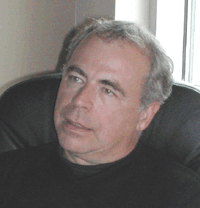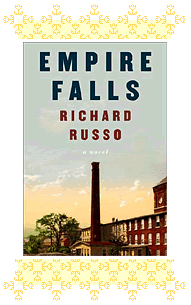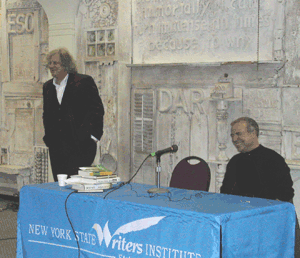
| NYWI HOME PAGE | VISITING WRITERS & EVENTS INDEX | VIDEO ARCHIVES | BLOG |
 |
NYS Writers Institute, September 25, 2002
4:15 p.m. Seminar | Assembly Hall, CC, Uptown Campus
8:00 p.m. Reading | Page Hall, Downtown Campus
PROFILE
Novelist Richard Russo is renowned for his depiction of blue collar life in abandoned mill towns in upstate New York and northern New England, believed to be modeled after the city he grew up in, Gloversville, New York. He is regarded by many leading critics as the most important writer about "Main St., USA" since Sherwood Anderson and Sinclair Lewis.
"[Russo] brilliantly evokes the economic and emotional depression of a failing town, a place where even the weather is debilitating and the inhabitants seem to struggle merely to stay in place." - Hilma Wolitzer in Tribune Books
 His recent best-selling novel, Empire Falls (2001, Knopf) won the 2002 Pulitzer Prize. The novel is set in a former logging and textile town in Maine, and follows the misadventures of Miles Roby, manager of a greasy spoon called the Empire Grill. Empire Falls provides a panoramic view of small town life; its faded upper class, unemployed millworkers, angry youth, petty crooks, mediocre public officials, and numberless eccentrics--all of them left behind by the new economy.
His recent best-selling novel, Empire Falls (2001, Knopf) won the 2002 Pulitzer Prize. The novel is set in a former logging and textile town in Maine, and follows the misadventures of Miles Roby, manager of a greasy spoon called the Empire Grill. Empire Falls provides a panoramic view of small town life; its faded upper class, unemployed millworkers, angry youth, petty crooks, mediocre public officials, and numberless eccentrics--all of them left behind by the new economy.
"The history of American literature may show that Richard Russo wrote the last great novel of the 20th century." - The Christian Science Monitor on Empire Falls
The Whore's Child, Russo's first collection of short stories was published in July 2002.
"a wonderful distillation of Russo's gifts for crystal-clear narration, subtle character portrayal, and impressible humor," - Kirkus on The Whore's Child
"Russo's rueful understanding of the twisted skein of human relationships is as sharp as ever, and the dialogue throughout is barbed, pointed, and wryly humorous. The collection is a winner." - Publishers Weekly on The Whore's Child
Russo's earlier novels include Mohawk (1986), The Risk Pool (1988)--both set in fictional Mohawk, NY, a town plagued by unemployment and polluted water--and Straight Man (1997), a story of academic politics set in a rural Pennsylvania college town. Russo also co-wrote the screenplay of another Paul Newman film, Twilight (1988), co-starring Susan Sarandon, Gene Hackman, and Reese Witherspoon. His teleplay Flamingo Rising (2000), was produced by the Hallmark Hall of Fame this past winter.
". . .a rich, humorous, elegantly constructed novel rooted in the bedrock traditions of American fiction.. .this is easily Mr. Russo's most seductive book thus far. . ." - Janet Maslin in The New York Times on Empire Falls
Russo is best known for his novel, Nobody's Fool (1993), which provides the basis for a major 1994 motion picture starring Paul Newman, Melanie Griffith, Jessica Tandy and Bruce Willis. The film received Oscar nominations for Best Actor and Best Screenplay. The novel is set in the fictional upstate New York town of North Bath, a former mineral spa whose springs dried up abruptly. North Bath is the sickly sister city of Schuyler Springs, a prosperous resort. Capital Region residents recognize North Bath as Ballston Spa, and Schuyler Springs as Saratoga. The novel features Russo's trademark cast of likable layabouts, cranks and misfits.
". . .a rude, comic, harsh, galloping story of four generations of small-town losers, the best literary portrait of the backwater burg since 'Main Street.'" - E. Annie Proulx - on Nobody's Fool
Russo lives in Maine with his wife and their two daughters. A former Professor of English and American Literature at Main's Colby College, Russo retired at the age of 47 to pursue writing full time.
"After the last sentence is read, the reader continues to see Russo's tender, messed-up people coming out of doorways, lurching through life. And keeps on seeing them because they are as real as we are." - Annie Proulx
"Richard Russo [is] a masterful storyteller with a mission: to chronicle with insight and compassion the day-to-day life of small-town AmericaA. . .alternating episodes of boisterous humor with moments of heart-wrenching pathos. . .His characters are wholly sympathetic, but they are also human." - Houston Chronicle
Books by Richard Russo




A Conversation with Richard Russo, author of Empire Falls
Q. Was there a particular event or image that sparked Empire Falls?
A. When I finish a novel it's hard to go back and try to reconstruct its beginnings. It's a little like an interrogation: what did you know and when did you know it? Here are a couple of things, though. When I was living in Waterville, Maine, some years ago, a factory closed down that had employed a large number of women who had been sewing famous-label men's dress shirts for much of their lives. They'd done everything they could to save their jobs and the factory, but the multi-national company that owned it shut them down anyway. That struck me as a story that was playing out all over the country, if not the world. From the beginning of my writing career, I've always been interested in ordinary people swept up in economic and political forces they can't begin to comprehend, as well as in the changing face of American labor. Becoming a writer has only deepened my sympathies for working people, who are always, it seems to me, the first to be sold out.
The other event that had burrowed deep was the school shooting in Paducah, especially the question it begged: how could such a thing happen here? The answers that are typically offered to such questions are sociological and political--tighter gun control return to family values, reducing violence on television and video games. Better answers to such impossible questions, I've always thought, are offered by novels, which ask you to live horror rather than simply witness or think about it.
Finally, in my previous novels I've written a lot about fathers and sons. As a father of two beloved daughters, I thought it high time to put a father/daughter relationship at the heart of one of my novels. In fact, now that I look back on it, it's the thing I'm most proud of in this new book.
 Q. Empire Falls has a large cast of characters, any of whom might have been the center of the novel. How did you decide on Miles Roby the middle-aged manager of the Empire Falls as your protagonist?
Q. Empire Falls has a large cast of characters, any of whom might have been the center of the novel. How did you decide on Miles Roby the middle-aged manager of the Empire Falls as your protagonist?
A. I suppose there are two answers to this question. The first is kind of a non-answer, though it may be the truer. Such decisions are often intuitive; they feel right. Which is another way of saying that you decide before you're even aware of the fact that you have a decision to make. The more "analytical" answer is that of all the characters in the novel Miles may be the most trapped--and that's saying something, since they're all trapped in one way or another. Janine is trapped by her need to be beautiful; Tick by her youth; David Roby by an accident. Even Mrs. Whiting, who rules the town, is in a way corned by it. But Miles is trapped more interestingly and more completely--by the past, by his faith, by an old love, by his devotion to his daughter, by his own decency. I'm always drawn to the character whose dilemma is such that I can imagine what I would do if I were in his shoes.
Q. People in Empire Falls often remind Miles that he stands to inherit something from Mrs. Whiting, yet the very possibility of this inheritance seem to imprison him. Is this an example of the price of wealth, even predicted wealth?
A. I suppose that's one way to look at it. My own feeling is that people are generally wrong to wait for others to make good on promises, either explicit or implied. Was it Lillian HeIlman who used to tell young women writers: "Don't expect anyone to save you? Save yourself" Maybe it was Flannery O'Connor. Somebody pretty damn smart, anyway. It's good advice, but tough to follow when you've been told the check's in the mail. Whole communities wait for promises to be ful.filIed, long after those who made the promises are dead and buried. And like individuals, communities imagine promises and also mishear them. Miles is pretty sure Mrs. Whiting has made a promise, but is it one he heard? Imagined? Hoped for? And even if it were granted, would that be a good or bad thing?
Q. Can you talk about the effect of the collapse of smaII-town economies on the younger generation, as represented by Miles's daughter Tick and her peers?
A. I think the place you grow up in is a lot like "The Hotel California": you can check out any time you like, but you can never leave. We'll never know any place better than the place we grew up, and no place, I suspect, wi1I ever be more important to us, at least in terms of our imaginative lives. For that reason there's something tragic in the understanding that many kids from small towns have--that in order to be a success in life, they'll have to leave; to remain behind would be an admission of failure. For many, it means leaving their heart's home. Then again, there's a long American tradition, embodied in the novels of Scott Fitzgerald and Sinclair Lewis and others, which suggests that leaving a small town may be about the best thing that can happen to any young person. One thing seems clear: we've become a far-flung nation. "Where do you want to go today?" Bill Gates wants to know. Implied is that nobody wants to stay home.
Q. Miles considers the rich "beautiful people" on Martha's Vineyard almost foreign to him, and yet he's drawn to them. Do you find yourself identifying with this perspective?
A. WeII, who isn't attracted to beauty? Or, for that matter, to things foreign? Both Gatsby and Nick Carroway are attracted to the mansions and the fancy cars and the wild parties on Long Island, just as Pip is attracted to privilege in Great Expectations. Show me someone who claims not to be attracted to such things and I'll show you either a liar or a person with no imagination. That said, wealth and beauty playa key role in Gatsby's destruction, and they cause Pip to behave in such a way that he loses all sense of his truest self. In the end they send Nick scurrying back to his bedrock Midwest values, feeling like he himself has dodged a bullet. Such is the nature of seduction.
Q. How do you imagine Mainers, and other New Englanders, will respond to the novel?
A. No clue. I thought academics would hate my last novel, Straight Man, but for the most part they've embraced it. When I read from the novel on book tour, professors showed up wearing those fake nose/glasses I have Lucky Hank wearing when he threatens to kill a duck a day. In general, I think people like having their experience of life validated; they like to think they count and they're glad you've noticed them, even if you get things wrong. In Empire Falls, I don't want to "do Maine" in the sense of using a lot of down-east dialect or local color. Even when I was writing about upstate New York, I was always more interested in locating people by class and work than by region; it's the latter that makes you a "regional" writer, I suspect.
I hope people in Maine like the book; in the past, I've sold very well in New England. But my greater hope is that the book will ring true everywhere.
Q. What might surprise your readers about Empire Falls?
A. Well, I hope everything and nothing. "When a favorite author of mine comes out with a new book, I always hope for two contradictory things: first, I hope it's like all the other books of his or hers that I love, and second, I hope he's not going to repeat himself. Sure, it's a paradox, but I suspect I'm not alone in my desires. So, I hope that when readers pick up Empire Falls and read the first chapter they'll feel that, yes, they're in a Russo novel, but not one they've read before. I'd also hope that their surprises in the reading parallel my own in the writing; I was surprised on virtually every page, and I hope readers will be too, because I wouldn't like to think that either my style or my peculiar way of seeing things have become predictable. What surprised me most about the book was how much it took out of me. Even though we know it won't, most authors keep hoping that writing novels will get easier as a result of experience. It doesn't, probably because it's not supposed to.
Previous Articles:
Nobody's Fool
BookShow Transcript
Writers Online Magazine Article
Sunday Gazette Article
Random House Excerpted Prologue
For additional information, contact the Writers Institute at 518-442-5620 or online at https://www.albany.edu/writers-inst.